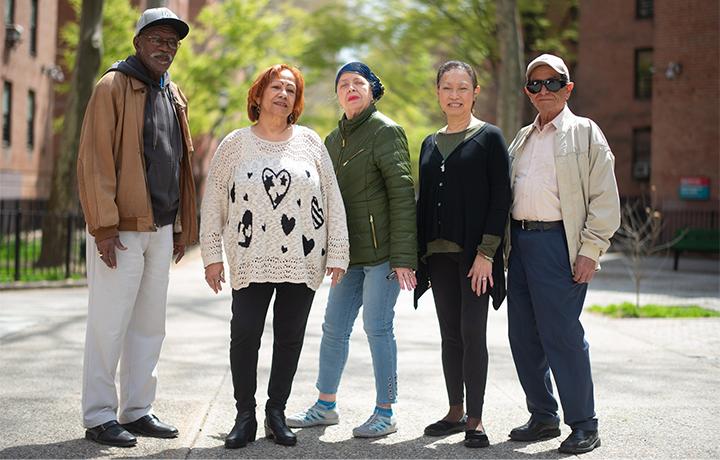Reimagining New York City’s Future: Prioritizing the Needs of Senior Residents in the Mayoral Race
Overlooked Challenges: Seniors and the City’s Ambitious Reform Plans
As New York City gears up for a consequential mayoral election, the political discourse is dominated by visions of innovation and sweeping change. However, amid these promises, many older New Yorkers feel their specific struggles are being neglected. While younger populations and tech-driven initiatives often take center stage, the everyday realities of seniors-such as limited transportation options and scarce affordable healthcare-are frequently sidelined. This oversight risks deepening the divide between the city’s progressive aspirations and the practical needs of its aging citizens.
Critical issues that remain insufficiently addressed include:
- Scarcity of affordable, senior-appropriate housing options
- Under-resourced community healthcare and mental health services tailored for older adults
- Public transit systems lacking adequate accommodations for mobility impairments
Below is a snapshot of current shortcomings and areas ripe for improvement in policies affecting seniors:
| Sector | Present Condition | Recommended Enhancements |
|---|---|---|
| Housing | Rising rents and limited senior-specific units | Expand affordable housing developments designed for seniors |
| Healthcare | Insufficient funding for community-based and mental health programs | Increase investment in home care and mental health support |
| Transportation | Many subway stations and buses remain inaccessible | Enhance accessibility features and broaden shuttle service coverage |
How Policy Shortfalls Affect the Well-Being of Older New Yorkers
Despite rhetoric about inclusive leadership, many seniors in New York City continue to grapple with systemic barriers that compromise their quality of life. The lack of affordable healthcare, secure housing, and dependable transportation options not only threatens their independence but also exacerbates health inequities. Moreover, the absence of robust social programs to counteract isolation leaves many elderly residents vulnerable to loneliness and mental health challenges.
Key domains impacted include:
- Healthcare access: Prolonged wait times and limited availability of in-home care services.
- Affordable housing: A shortage of subsidized units forces many seniors into unstable living conditions.
- Transportation: Public transit often fails to meet the needs of those with mobility impairments.
- Social connectivity: Insufficient community engagement initiatives to reduce isolation.
| Policy Focus | Current Reality | Proposed Solutions |
|---|---|---|
| Healthcare | Limited Medicaid coverage and scarce long-term care options | Expand home-based care services and streamline access |
| Housing | Escalating rents and few senior-specific accommodations | Increase availability of subsidized senior housing |
| Transportation | Paratransit services are insufficient and unreliable | Improve service frequency and accessibility features |
| Community Engagement | Underfunded senior centers and outreach programs | Enhance funding to foster social inclusion |
Aligning Progressive Policies with the Realities of Aging Populations
New York City’s political momentum increasingly favors progressive ideals emphasizing sustainability, innovation, and economic growth. However, this focus often sidelines the immediate and practical needs of older residents. While green transit initiatives and tech-driven healthcare reforms are vital, they must be balanced with accessible transportation, affordable healthcare, and secure housing tailored to seniors. Ignoring these needs risks alienating a significant demographic and widening generational disparities.
Addressing this divide requires:
- Embedding senior-centered programs within broader urban development plans
- Amplifying the participation of older adults in policy formulation and decision-making
Without intentional inclusion, even the most well-meaning reforms may inadvertently exclude older New Yorkers. A collaborative approach that harmonizes progressive goals with the lived experiences of seniors is essential for equitable urban progress.
| Focus Area | Progressive Priorities | Senior Community Needs |
|---|---|---|
| Transportation | Sustainable, low-emission transit options | Dependable, accessible transit for mobility-impaired seniors |
| Healthcare | Innovative, cost-effective healthcare reforms | Expanded in-home care and chronic disease management |
| Housing | Eco-friendly urban living spaces | Safe, affordable, and accessible housing for seniors |
Strategies for Inclusive Leadership That Embraces All Age Groups
Closing the generational gap requires more than recognition-it calls for deliberate policies that empower voices from every age bracket. City leaders must cultivate spaces where older New Yorkers feel acknowledged and influential, ensuring that their unique perspectives shape policy outcomes. This can be achieved by fostering intergenerational dialogue platforms that blend the wisdom of elders with fresh ideas, resulting in solutions that benefit the entire community rather than favoring one group.
Additional approaches to foster inclusive governance include:
- Ongoing engagement: Organize regular town halls and listening sessions specifically for seniors to express their concerns and suggestions.
- Diverse leadership teams: Assemble policy committees that reflect a broad age range to co-develop initiatives.
- Age-conscious urban design: Plan public spaces and transit systems that accommodate mobility and accessibility requirements.
- Clear, inclusive communication: Craft messaging that resonates across generations and is easy to understand.
Looking Ahead: Ensuring Equitable Progress for New York’s Seniors
As New York City anticipates new leadership, it is imperative that the concerns of its senior residents remain central to the dialogue. While the mayoral candidates champion transformation and innovation, true progress hinges on embracing the diverse needs of all citizens, especially the aging population. Crafting policies that uplift every generation will not only define the success of the upcoming administration but also shape a genuinely inclusive and resilient future for the city.













